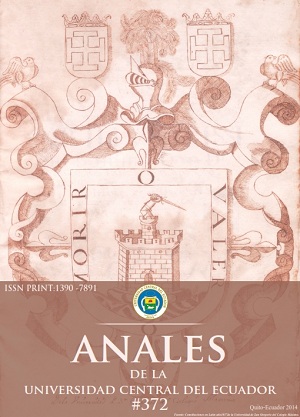Se configura la segunda síntesis de la teoría evolutiva
DOI:
https://doi.org/10.29166/anales.v1i372.1237Keywords:
Evolution, Evolutionary theory, Darwinism, Neo-Darwinism, Expanded synthesisAbstract
Evolutionary theory is the fundamental theory of biology. It was presented to the scientific community in two small trials of evolution. The natural selection prepared independently by Charles Darwin and Alfred R. Wallace. After the publication of Darwin's main book: The Origin of Species, which provides numerous tests and a comprehensive explanation of the theory of descent - evolutionary thinking, it was called: Darwinism.
With the advancement of life sciences in the mid- twentieth century classical Darwinism is reformulated into a new body: the Synthetic Theory of Evolution or Neo-Darwinism that is based on Mendelian genetics and population genetics and on this basis was constructed modern evolutionary thought which took full effect in most of the last century. Questions arose within the neodarwinismo not questioning the validity of the theory of evolution by natural selection, but that led to incorporate other factors that explain the evolutionary transformation, besides to the selection. Under this perspective work has been done in recent decades to the point that now a second synthesis of the theory of evolution or Expanded Synthesis is talked, emerging from the conceptual framework of molecular genetics, genomics, developmental biology and ecology, giving a new paradigm known as Eco- Evo- Devo.
If the Synthetic Theory of Evolution was one of major advances in biological sciences from the previous century, the second synthesis or Expanded Synthesis is emerging as the most momentous theoretical construct of today’s biology.
References
BLANC, M. 1982. Las Teorías de la Evolución. En: Mundo Científico (La Recherche) 12:288-303
• CAMPBELL, N., et al. 2001. Biología: Conceptos y Relaciones. 3ª. Ed. Person Educación. México.
• FREEMAN, S., HERRON, J.C. 2002. Análisis Evolutivo. 2a. ed. Prentice Hall. Madrid.
• DE RENZI, M. 1983. El neodarwinismo y las críticas impuestas a su reduccionismo radical por la paleontología y la biología del desarrollo. En: Evolucionismo y Cultura, ed. A. Dor. Ediciones Mensajero, Bilbao, España.
• ELDREDGE, N. 1982 La Macroevolución. En: Mundo científico (La Recherche) 16:972-803
• GILBERT, S.F. 2006. Biología del Desarrollo. 7ª.edición. Editorial Médica Panamericana. Buenos Aires, Argentina.
• GALLARDO, M. 2011. Evolución: El Curso de la Vida. Editorial Médica Panamericana. Buenos Aires.
• GALLARDO, M. 2013. Alfred Russel Wallace: Obra y figura. Revista Chilena de Historia Natural 86:214-250.
•GOULD, S. J. 2004. Estructura de la Teoría de Evolución. Tusquets Editores S.A. Barcelona.
• LEIGTH, B. 1986. El Legado de Darwin. Salvat Editores, Barcelona, España.
• LINDSAY, S. 2003. Develompmental Evolution. Enciclopedia del Genoma Humano. Macmilan Publishers Ltd. Nature Publishing Group. www.ehgonline.net
• MAYR, E. 1978. La Evolución. En: Investigación y Ciencia (Scientific American) 26:2-16.
• MAYR, E.1998. Así es la Biología. Editorial Debate, S. A., Madrid.
• MUÑOZ-CHÁPULI, R. 2009. Evo-Devo: Hacia un nuevo paradigma en Biología evolutiva. http://www.encuentros.uma.es/encuentros100/evodevo.htm. 16/03/2009.
• REIG, O. 1983. Teoría de la Especiación Animal. En: IX Congreso Latinoamericano de Zoología, Informe final. Ed. Pedro Aguilar. Arequipa, Perú.
• RUFFIÉE, I. 1983. De la Biología a la Cultura. Muchnik. Editores, S.A. Barcelona España
• WADDINGTON, C. H. et al, 1976. Hacia una Biología Teórica. Ed. Alianza. S.A. Madrid España.


